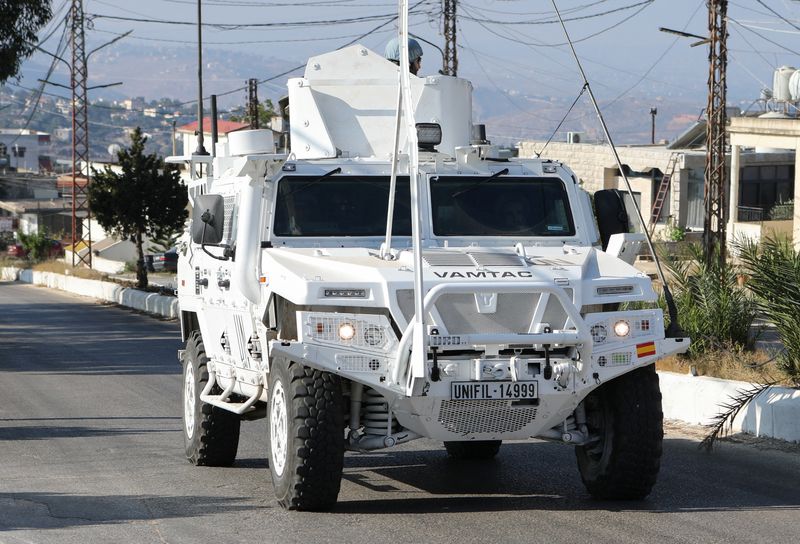By Crispian Balmer
ROME (Reuters) -The U.N. peacekeeping mission to Lebanon is vital to ending war in the region and needs to be strengthened, not withdrawn from combat zones as Israel has demanded, Italy's defence minister said on Thursday.
The U.N. mission known as UNIFIL is stationed in southern Lebanon to monitor hostilities along the demarcation line with Israel -- an area that has seen fierce clashes this month between Israeli troops and Iran-backed Hezbollah fighters.
Israel has said the U.N. forces are providing a human shield for Hezbollah and has fired at the UNIFIL bases repeatedly over the past week, injuring several peacekeepers. Prime Minister Benjamin Netanyahu says UNIFIL should temporarily "get out of harm's way".
Italy has long been a major contributor to the multi-national operation and has denounced Israel for its actions, straining relations between two nations, which have been very close under Italian Prime Minister Giorgia Meloni's leadership.
"Israel needs to understand that these (U.N.) soldiers are not working for any one side. They are there to help maintain peace and promote regional stability," Defence Minister Guido Crosetto told parliament on Thursday.
He said the resolution establishing the UNIFIL mandate was last revised in 2006 and needed updating.
"UNIFIL is a complex mission with a mandate that is difficult to implement, has inadequate rules of engagement and forces that are not equipped for the current conflict," he said.
Even though Italy wanted its 1,000-strong contingent to remain within the UNIFIL operation, it had evacuation plans ready, with seven planes on standby if needed.
Crosetto has called on the United Nations to boost UNIFIL's capacity, including creating a rapid deployment force to enhance its freedom of movement and giving it more fire power.
UN SYSTEM 'BEING ATTACKED'
UNIFIL is meant to ensure peace in southern Lebanon and guarantee that only the regular Lebanese army is present in the area. However, it has proved incapable of preventing Hezbollah from building up its forces or preventing Israeli incursions.
"The practical disconnect between the assigned mission and the capacity to implement it makes it more necessary than ever to rethink and strengthen UNIFIL," Crosetto said.
EU foreign policy chief Josep Borrell said on Thursday UNIFIL would remain and do its work, adding that Israeli attacks on UNIFIL meant that "the U.N. system is being attacked".
"UNIFIL has a duty. Their soldiers are at risk. But (EU) member states decided that their troops will remain," he said.
Israeli Foreign Minister Israel Katz said on Wednesday that Israel saw UNIFIL as playing a key role in the "day after" war on Hezbollah.
Meloni is due to travel to Beirut on Friday to discuss the situation with Lebanese officials -- the first Western leader to visit the country since the latest surge of violence.

Crosetto said he would also go to Beirut and Tel Aviv next week.
"I believe that Lebanon is a key piece for the stability of the entire Middle East," he said. "If we cannot even find the strength to have a strong, unified international action in a place like this, we probably won't succeed anywhere."